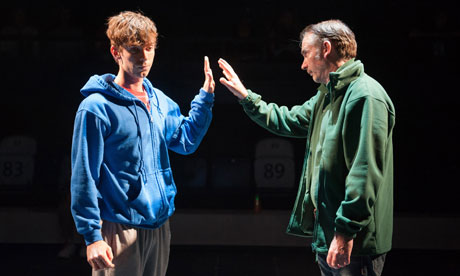
It doesn't matter a damn what I or my colleagues say about this adaptation of Mark Haddon's bestselling novel. Last night it was greeted with a great roar of approval. And, even though I found myself resisting occasional touches of self-conscious cuteness and sentimentality in Marianne Elliott's production, I readily acknowledge the whole thing is done with enormous flair.
Playwright Simon Stephens, for a start, solves the problem confronting any adapter. First he has a teacher (Niamh Cusack) reading aloud the story that 15-year-old Christopher Boone has fashioned from his Holmes-like investigation into the killer of his neighbour's dog; then, against Christopher's wishes, the novel is turned into a play. This not only frames the action, but also sets up a rich tension between fiction's invention and the obsession with facts, forensics and systemised data that is a symptom of Christopher's autism. His mathematical mind is also brilliantly reflected in Bunny Christie's design of glowing geometric grids, and in Paule Constable's lighting, which conveys the hero's love of the night sky.
A remarkable performance from Luke Treadaway captures all the hero's zeal, obduracy and terror of tactile contact, and pins down behavioural qualities all of us, at some point, see in ourselves. The movement direction, from Frantic Assembly's Scott Graham and Steven Hoggett, also conveys Christopher's confusion when confronted by the bustle of London life. I flinch from manipulative touches such as miniaturised trains and a live dog: two things calculated to send audiences into swooning raptures. But this is a highly skilful adaptation, and Paul Ritter and Nicola Walker as Christopher's parents movingly remind us of the messily contradictory human emotions that co-exist with their son's world of perfect patterns.

